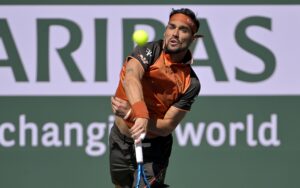With Andy Murray forced to withdraw from this year’s US Open with a hip injury, British tennis fans were expecting a foretelling of the post-Murray apocalypse, with plummeting interest and viewing figures as the country waits another 77 years for a Grand Slam champion. But while Konta capitulated and Watson walked, Kyle Edmund and Cameron Norrie kept British hopes alive on Monday as they eased into the second round.
Coke Behind Edmund Success
Flushing Meadows is becoming quite the stomping ground for Edmund. The 22-year-old claimed the finest win of his career over Richard Gasquet on his way to the fourth round last year, and his 2017 campaign has started in a similar vein, dispatching 32nd seed and recent Montreal semifinalist Robin Haase 6-3 7-5 6-3 in under two hours.
It was a swift, clinical display, the likes of which Murray would have been proud of. Edmund won the first set in just 35 minutes and suffered only a slight hiccup in the second, dropping serve at 5-4 before swiftly taking the next two games. Indeed, in contrast to his senior compatriot, the return has often been a glaring weakness in the Johannesburg-born Edmund’s game, and yet he was dominant on Haase’s serve, breaking five times.
But a packed hard court swing in the States may have taken its toll. Having reached the semifinals of the Winston-Salem Open as a qualifier last week, the World #42’s victory over Haase was his eighth match in nine days. “The challenge today was to keep the intensity high because I felt pretty tired,” Edmund admitted, and he was forced to take remedial measures, McEnroe-style. “I had a Coke, just to put some sugar in my body. I needed it to get myself going, and it worked.”
Despite fatigue, Edmund’s heavy topspin forehand stifled the offensive-minded Haase, particularly punishing the Dutchman’s second serve, on which the Brit won 64% of points. Certainly reason to be cheerful then. “Any time you can get to a Grand Slam and get through day one in straights is definitely a win, but definitely a great win both tennis-wise, emotionally, everything put together,” he said.
However, as the highest-ranked British male player in the tournament, with Murray’s injury and Evans’ impending ban, there are question marks over whether Edmund has the maturity or the game to meet high expectations going forward. We might cast our mind back to the young Brit’s press conference at Wimbledon after his first appearance on Centre Court, a straight-sets defeat to Gael Monfils. “I’m only 22 years old, I don’t know all the answers,” he mumbled dolefully.
The Frenchman exposed the shortcomings of his game that day, and he knew it. In the face of Monfils’ unorthodox variation, Edmund looked one-dimensional, a player with a big forehand but little guile.
The US Open hard courts are less likely to show up this vulnerability, but his next round will certainly be a stern examination of his mental fortitude, as he faces home favourite Steve Johnson.
TCU’s Norrie Continues to Flourish
Meanwhile, Cameron Norrie defeated #640-ranked Dmitry Tursunov 7-6(7) 6-1 after the Russian retired with a knee injury.
While it was his veteran opponent’s 84th Grand Slam match, his slam debut made at Flushing Meadows 14 years ago, it was only Norrie’s second after losing to Tsonga in the first round of Wimbledon in July. There were certainly no signs of the 22-year-old being cowed by Tursunov’s pedigree, though, and in the opening set he doggedly held serve to take it to a tiebreak.
It proved to be a closely-fought affair, and Norrie displayed remarkable composure, saving a set point before clinching the tiebreak 9-7.
As his opponent rued what could have been and began to struggle with a knee injury, Norrie decisively took control, taking six games on the spin after dropping serve in the opening game of the second set. “I don’t think he wanted to complete the second set,” Norrie remarked. “His knee was bothering him as well. Looking back this will be great, but it’s kind of disappointing not winning the last point and him retiring.”
Despite being denied the moment of euphoria of a first Grand Slam victory, Norrie was still celebratory. “I might have a couple of brewskies later tonight and enjoy it,” the 22-year-old said, before taking on more New Zealand slang with his regular phrase: “I’m stoked.”
Such Kiwi jargon belies the close ties Norrie has with America. After three years’ training at the National Tennis Centre in London, Norrie left to major in Sociology at Texas Christian University. It would prove to be integral to his development, giving him that elusive quality in sport: perspective.
“I wasn’t used to playing so much tennis,” he told The Independent. “It was good but I just wasn’t used to it. The LTA gave me a lot of help and a lot of coaching, and it was just too much for me to take on board. Everything was about tennis and I wasn’t used to that. That was one of my reasons why I went to college, to have a more balanced lifestyle and a normal life.”
“I was just burnt out from tennis a bit after the juniors and I felt like I wanted to do something else. College helped me learn to love the game again.”
Norrie’s tennis flourished, and by the end of his three years in April, the Intercollegiate Tennis Association had placed him #1 in the Division I Men’s National Singles Rankings after being the only player to maintain a 100% winning record in Big 12 matches. Nevertheless, his move from college tennis to the top of the men’s game in a matter of months has been truly remarkable – success on the American Challenger circuit, taking the title in Binghamton, before qualifying for New York without dropping a set.
Norrie’s self-belief was refreshingly clear in his take on his next opponent, world #19 Pablo Carreno-Busta. “He [Carreno Busta] is going to give me some rhythm, he’s not going to serve me off the court, it’s going to be nice, I can play my own game and feel comfortable,” he said. “Obviously he’s a great player and it’s going to be really tough but I’m looking forward to the challenge.” With Norrie’s terrific variation, finesse and fleetness of foot to match, there is undoubtedly reason to be confident.
The BBC have been quick to assert Norrie’s Scottish heritage, but having been born in Johannesburg like Edmund, raised in New Zealand, and developed into a professional tennis player in the US, there will inevitably be the same cynicism that plagued Konta’s Wimbledon run. Hopefully it will not overshadow the optimism that Britons should be feeling around their upcoming male stars.
Main Photo:
Embed from Getty Images





